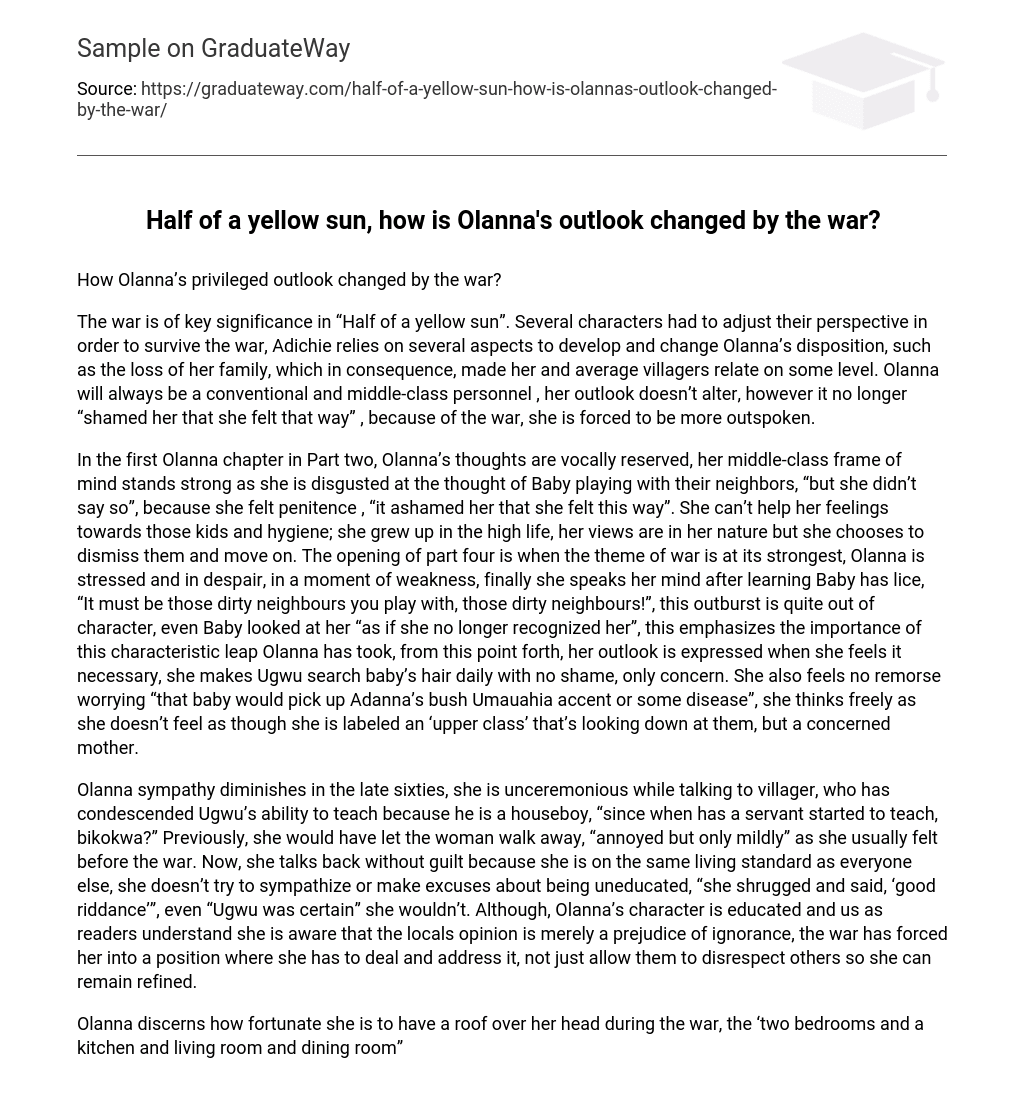How Olanna’s privileged outlook changed by the war?
The war is of key significance in “Half of a yellow sun”. Several characters had to adjust their perspective in order to survive the war, Adichie relies on several aspects to develop and change Olanna’s disposition, such as the loss of her family, which in consequence, made her and average villagers relate on some level. Olanna will always be a conventional and middle-class personnel , her outlook doesn’t alter, however it no longer “shamed her that she felt that way” , because of the war, she is forced to be more outspoken.
In the first Olanna chapter in Part two, Olanna’s thoughts are vocally reserved, her middle-class frame of mind stands strong as she is disgusted at the thought of Baby playing with their neighbors, “but she didn’t say so”, because she felt penitence , “it ashamed her that she felt this way”. She can’t help her feelings towards those kids and hygiene; she grew up in the high life, her views are in her nature but she chooses to dismiss them and move on. The opening of part four is when the theme of war is at its strongest, Olanna is stressed and in despair, in a moment of weakness, finally she speaks her mind after learning Baby has lice, “It must be those dirty neighbours you play with, those dirty neighbours!”, this outburst is quite out of character, even Baby looked at her “as if she no longer recognized her”, this emphasizes the importance of this characteristic leap Olanna has took, from this point forth, her outlook is expressed when she feels it necessary, she makes Ugwu search baby’s hair daily with no shame, only concern. She also feels no remorse worrying “that baby would pick up Adanna’s bush Umauahia accent or some disease”, she thinks freely as she doesn’t feel as though she is labeled an ‘upper class’ that’s looking down at them, but a concerned mother.
Olanna sympathy diminishes in the late sixties, she is unceremonious while talking to villager, who has condescended Ugwu’s ability to teach because he is a houseboy, “since when has a servant started to teach, bikokwa?” Previously, she would have let the woman walk away, “annoyed but only mildly” as she usually felt before the war. Now, she talks back without guilt because she is on the same living standard as everyone else, she doesn’t try to sympathize or make excuses about being uneducated, “she shrugged and said, ‘good riddance’”, even “Ugwu was certain” she wouldn’t. Although, Olanna’s character is educated and us as readers understand she is aware that the locals opinion is merely a prejudice of ignorance, the war has forced her into a position where she has to deal and address it, not just allow them to disrespect others so she can remain refined.
Olanna discerns how fortunate she is to have a roof over her head during the war, the ‘two bedrooms and a kitchen and living room and dining room” would have seemed miniature in the early sixties as she is used to rooms the size of “flats”, however she realizes “The scarcity is serious…” and is grateful, “we are lucky to know an indigene of Umuahia”, in the beginning she trivialized the situation, telling people to “calm down” however now she is aware of the consequences of the war, this is a reflection on the personal growth the war has put her through, she went from being a naïve college graduate to a wife, a guardian and a victim of war, her perspective changes due to all the responsibility she has to take on, she no longer strives for luxury but for basic survival. Olanna starts relying on herself more and finds it quite empowering, “She had made soap.” The use of a short statement creates a strong sense of confidence; it emphasizes how proud she is of her achievement.
The theme of character development is evident here as Olanna gains this new recognition of independence, this still shows her middle-class of mind, she has pride in her work although this is what most villagers would be doing anyway. It shows her state of mind may have not been changed, however she doesn’t find the soap unappealing, but was taken aback by how “it lathered”, she is growing accustomed to this new life. The war carried many themes that Olanna has experienced, such as loss and personal growth. Both greatly affected her character, forcing her to be a stronger person, in order not to be swept away by the ‘dark swoops’, her privileged outlook was not the only thing that she had to alter but also her ability to speak her thoughts and worries as well as express her views, without feeling repentant, this was essential to survive through the war.





